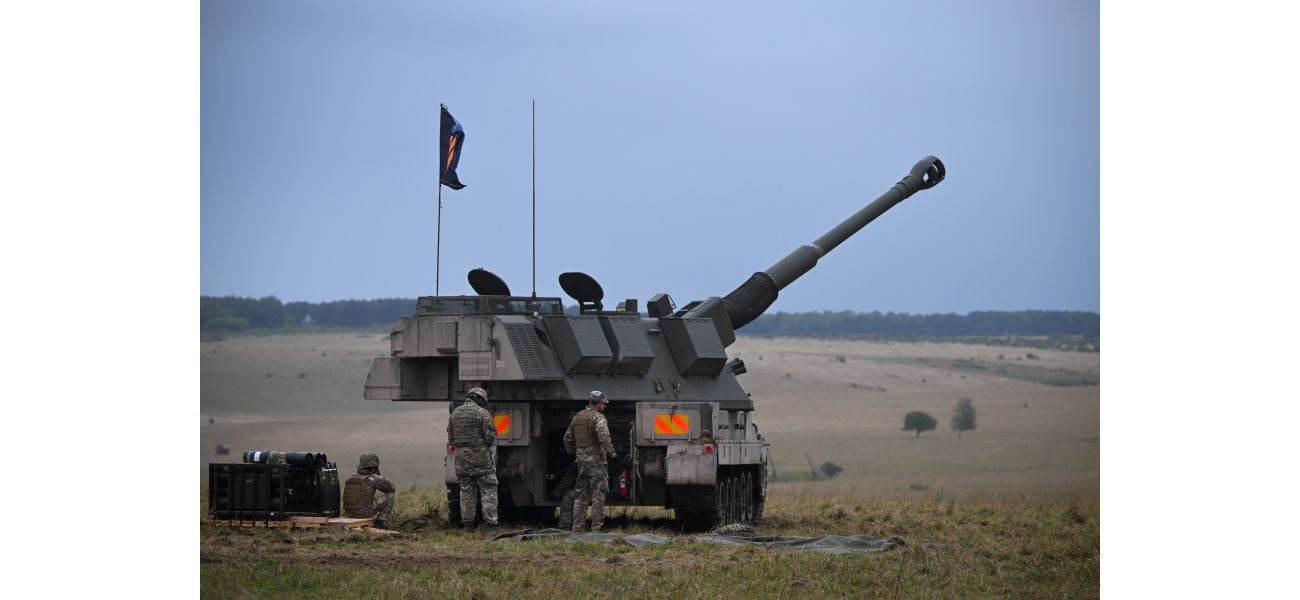UK army running low on supplies as billions spent on military aid for Ukraine.
British weapons are being deployed in battle.
September 15th 2024.

The recent shipment of AS90 mobile artillery guns from the UK to Ukraine has caused a stir in the military world. It has been seen as a generous move by the UK to support Ukraine in their fight against Russia, but it has also raised concerns about the capability gaps within the British armed forces.
In addition to the Challenger 2 tanks, millions of rounds of ammunition, and hundreds of vehicles, the UK has also committed a whopping £7.6 billion in military aid to Ukraine since the full-scale invasion by Russia in February 2022. This aid has certainly made a difference, with all of the donated Challengers being put to use on the frontlines against Russia's Soviet-built tanks.
However, this massive aid package has also put a strain on the UK's own military supplies. The transfer of almost all of the country's AS90 mobile artillery units to Ukraine has created a gap in the UK's operational capabilities, according to armed forces minister Luke Pollard. He acknowledged the importance of the aid sent to Ukraine, but also highlighted the need to replenish their stocks and address the challenges faced in the interim period.
Interestingly, much of the aid sent to Ukraine was approved by the previous Conservative government and supported by Labour while they were in opposition. This support has continued under the new Labour government, with Defence Secretary John Healy meeting his Ukrainian counterpart in Odesa just 72 hours after celebrating their electoral victory.
The use of British tanks against older models of Russian tanks in Ukraine has also raised questions about the UK's military preparedness. The war in Ukraine, combined with depleted stocks and the evolving nature of warfare, has prompted the government to conduct a strategic defence review in the first half of next year. This review will assess whether their stocks are being replenished and if their armed forces have the necessary capabilities.
Mr Pollard emphasized that the world is currently a more difficult and contested place, and the defence review will show how the UK plans to respond to these challenges. He stated that the review will consider the capabilities needed to deter and defeat an aggressor, and how to transition from their current capabilities to the desired ones. He made it clear that the review is not about cutting, but rather about right-sizing their forces to match the capabilities required.
One potential outcome of the review could be the need to invest in additional capabilities to defend crucial sub-sea cables that carry electronic data. This could involve acquiring specialized vessels, such as the RFA Proteus, for the purpose of survey and surveillance. Mr Pollard pointed out the importance of protecting these data flows, as they are crucial for various aspects of daily life, including healthcare, air traffic control, and financial markets. He believes that the review will identify both risks and opportunities for the UK to invest in further capabilities.
In addition to the Challenger 2 tanks, millions of rounds of ammunition, and hundreds of vehicles, the UK has also committed a whopping £7.6 billion in military aid to Ukraine since the full-scale invasion by Russia in February 2022. This aid has certainly made a difference, with all of the donated Challengers being put to use on the frontlines against Russia's Soviet-built tanks.
However, this massive aid package has also put a strain on the UK's own military supplies. The transfer of almost all of the country's AS90 mobile artillery units to Ukraine has created a gap in the UK's operational capabilities, according to armed forces minister Luke Pollard. He acknowledged the importance of the aid sent to Ukraine, but also highlighted the need to replenish their stocks and address the challenges faced in the interim period.
Interestingly, much of the aid sent to Ukraine was approved by the previous Conservative government and supported by Labour while they were in opposition. This support has continued under the new Labour government, with Defence Secretary John Healy meeting his Ukrainian counterpart in Odesa just 72 hours after celebrating their electoral victory.
The use of British tanks against older models of Russian tanks in Ukraine has also raised questions about the UK's military preparedness. The war in Ukraine, combined with depleted stocks and the evolving nature of warfare, has prompted the government to conduct a strategic defence review in the first half of next year. This review will assess whether their stocks are being replenished and if their armed forces have the necessary capabilities.
Mr Pollard emphasized that the world is currently a more difficult and contested place, and the defence review will show how the UK plans to respond to these challenges. He stated that the review will consider the capabilities needed to deter and defeat an aggressor, and how to transition from their current capabilities to the desired ones. He made it clear that the review is not about cutting, but rather about right-sizing their forces to match the capabilities required.
One potential outcome of the review could be the need to invest in additional capabilities to defend crucial sub-sea cables that carry electronic data. This could involve acquiring specialized vessels, such as the RFA Proteus, for the purpose of survey and surveillance. Mr Pollard pointed out the importance of protecting these data flows, as they are crucial for various aspects of daily life, including healthcare, air traffic control, and financial markets. He believes that the review will identify both risks and opportunities for the UK to invest in further capabilities.
[This article has been trending online recently and has been generated with AI. Your feed is customized.]
[Generative AI is experimental.]
0
0
Submit Comment





